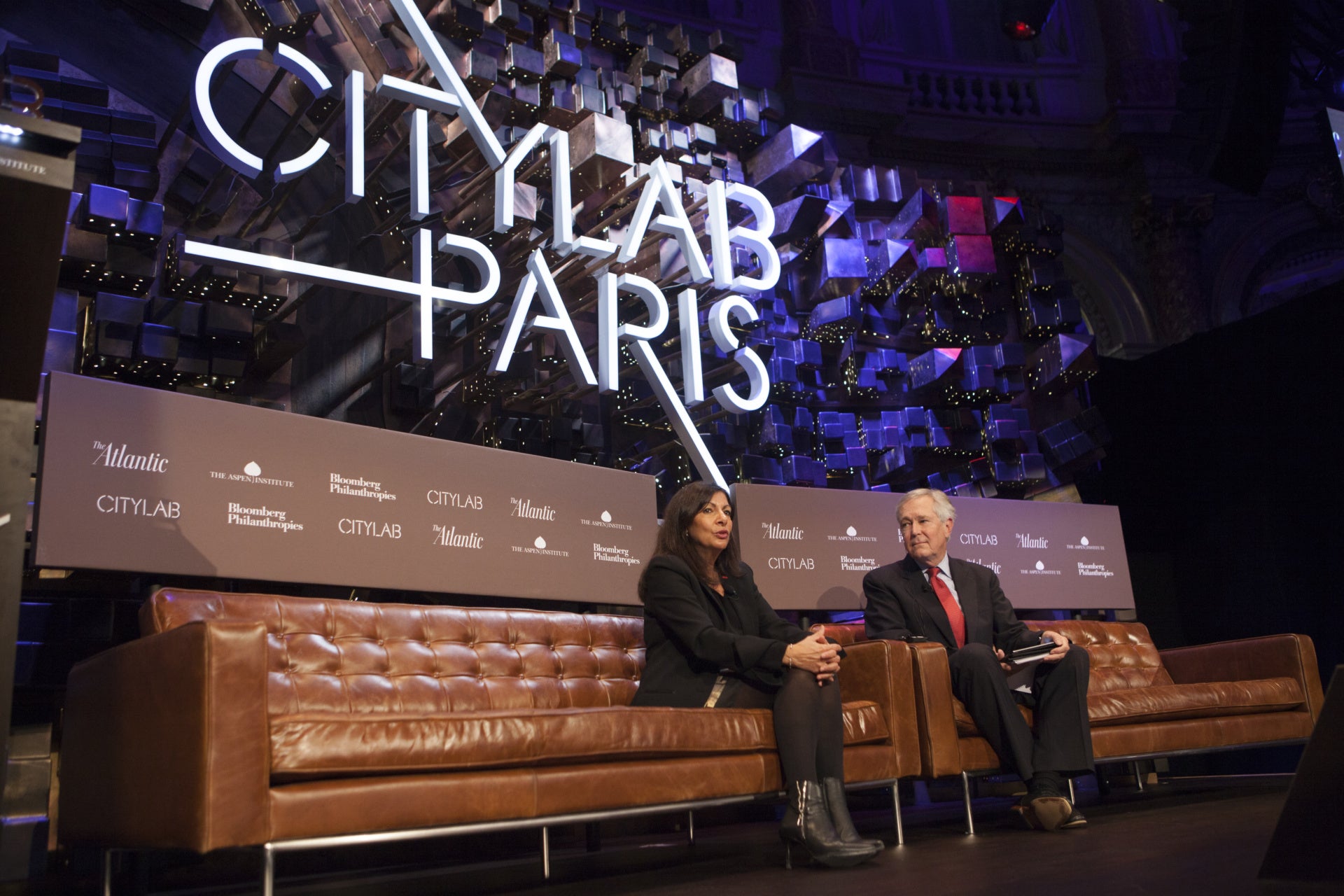
Mayor Anne Hidalgo and writer James Fallows
The Aspen Institute, along with partners Bloomberg Philanthropies and The Atlantic, hosted the fifth annual CityLab: Urban Solutions to Global Challenges on October 22 to 24. Each year, the event highlights the innovative urban strategies and leadership that make cities more effective, responsive, and inclusive. CityLab has previously been held in New York, Los Angeles, London, and Miami. This year, an international group of 37 mayors and more than 500 participants from over 135 different cities gathered in Paris for the two-day summit. The program emphasized the themes facing today’s city leaders, such as climate change, terrorism, citizen protests, refugee populations, autonomous vehicles, urban identity, and even loneliness.
CityLab kicked off with a special evening session featuring “night czars” from Amsterdam and London. Night czars are responsible for making their cities’ nighttime hours more culturally and economically vibrant for local businesses, residents, and tourists. Participants explored Paris by boat to learn about the city’s historic architecture along the Seine, and heard how current policies reduce carbon emissions by closing off parts of the riverbanks to traffic. Attendees also visited Station F, the world’s largest startup campus, housed inside an old freight depot in the city’s innovation district; the Musée d’Orsay for a special evening reception and private viewing; and Clichy-Batignolles, a more than 130-acre eco-district that includes energy-efficient office buildings, a rooftop urban farm, and affordable green housing.
Attendees were also given exclusive access to the new City of Paris Refugee Center, which was built to address the urgent need to provide temporary housing for the influx of refugees arriving daily. The center—which features a medical clinic, cafeteria, and French language lessons—has quickly gained international renown for its human-centered approach to the asylum process.
“Mayors directly confront the impact of climate change and the impact of the refugee crisis we know today in Europe,” Paris Mayor Anne Hidalgo, who chairs the climate leadership group C40 and who oversaw the creation of the refugee center, said. She argued that mayors should act for both their cities and the world. “We don’t have a planet B,” she said.
The Good Chance Theatre co-founders Joe Murphy and Joe Robertson returned to the CityLab stage this year. Good Chance, a British nonprofit, built its first theater at a refugee camp in Calais in the north of France in 2015 as a place for people to express themselves and “to escape or confront the situations they were in.” This year, artist Majid Adin, a refugee who participated in Good Chance during his time in Calais, joined Murphy and Robertson. “When I came as a refugee, I was just looking for a distribution center for food and clothes,” Adin said. But since taking part in the Good Chance Theatre, he has won a competition to create a music video for Elton John’s Rocket Man. Adin’/s work focuses on his experience leaving his country and starting a new life. Robertson said that art can be a first step toward refugee integration. “It is really compromise, understanding, empathy,” he said of addressing the refugee plight. “It is harder than any of us admit.”
Award-winning writers Ta-Nehisi Coates and Chimamanda Ngozi Adichie shared their perspectives on identity and belonging in cities. Referring to the diversity seen every day in New York subways, Coates said: “You can’t mistake that for real social integration. Everybody goes home afterwards. We live in separate communities.” Adiche agreed. “We have to be careful not to romanticize cities,” she said. “Something can be alienating about it. It can also feel as though people walk past one another.”
The Institute’s Eric Liu argued that cities are uniquely positioned to harness citizen power by organizing and sharing common objectives. “A city is not great if it does not make great citizens,” Liu said. It was a tone echoed by Greater Manchester Authority Mayor Andy Burnham, who reflected on the May terror attack in his city. “We actively said that we will come together as a community,” Burnham said. “There has been a sense of togetherness in defiance.”